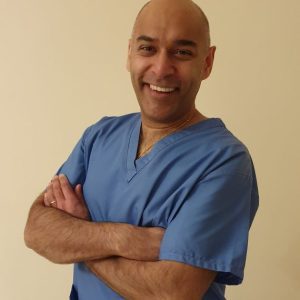
Mr Sanjay Gupta
Glasgow Royal Infirmary
Awarded: £149,967
The challenge
Sarcoma surgery can lead to lead to wound complications, like infection or failure of stitches, in about 1 in every 5 people. This is because other treatments like chemotherapy and radiotherapy can affect the body’s ability to heal properly. Complications can mean that wounds take longer to heal, which may result in a longer hospital stay or delays in further treatment.
How will this project tackle this challenge?
The SUNDIAL trial investigates a way to reduce complications and improve recovery, called Negative Wound Pressure Therapy (NPWT). A small device delivers suction through the wound dressing, creating an airtight seal. Over 5-7 days, excess fluid containing potentially harmful substances is removed from the area.
The team aim to enrol 94 patients undergoing surgery for sarcomas in the limbs or torso. Patients’ surgeries will be planned as usual by their doctors, but each person will be randomly allocated to receive either a standard dressing or the NPWT treatment following their surgery. Staff will examine how patients’ wounds are healing, noting any complications. Patients will be asked to complete short questionnaires to evaluate their recovery. Patients will be seen at standard of care visits at 3, 6, 9 and 12 months post-surgery to complete the same assessments, all within standard treatment requiring no additional trips to hospital.
What this means for people affected by sarcoma
Sarcoma surgery can be physically and emotionally stressful, but wound complications can make the recovery process even more challenging. The team behind this study aim for this work to create evidence as to whether all patients undergoing surgery should receive NWPT. It’s hoped that a simple and relatively cheap dressing like NWPT could reduce wound complications, and provide a better outcome and quality of life for patients.









